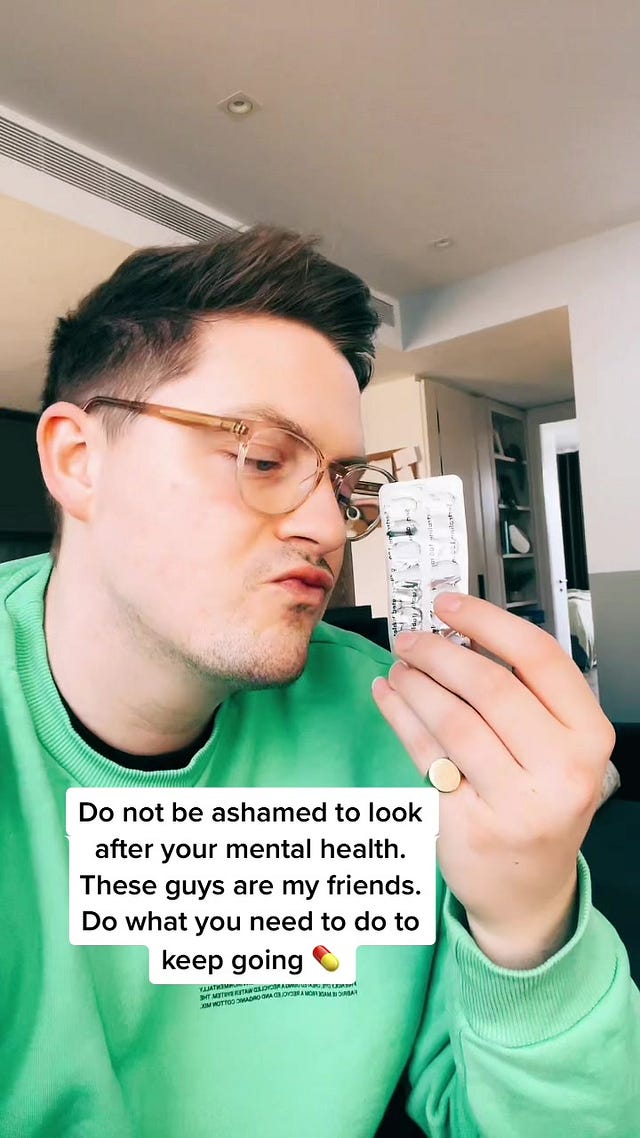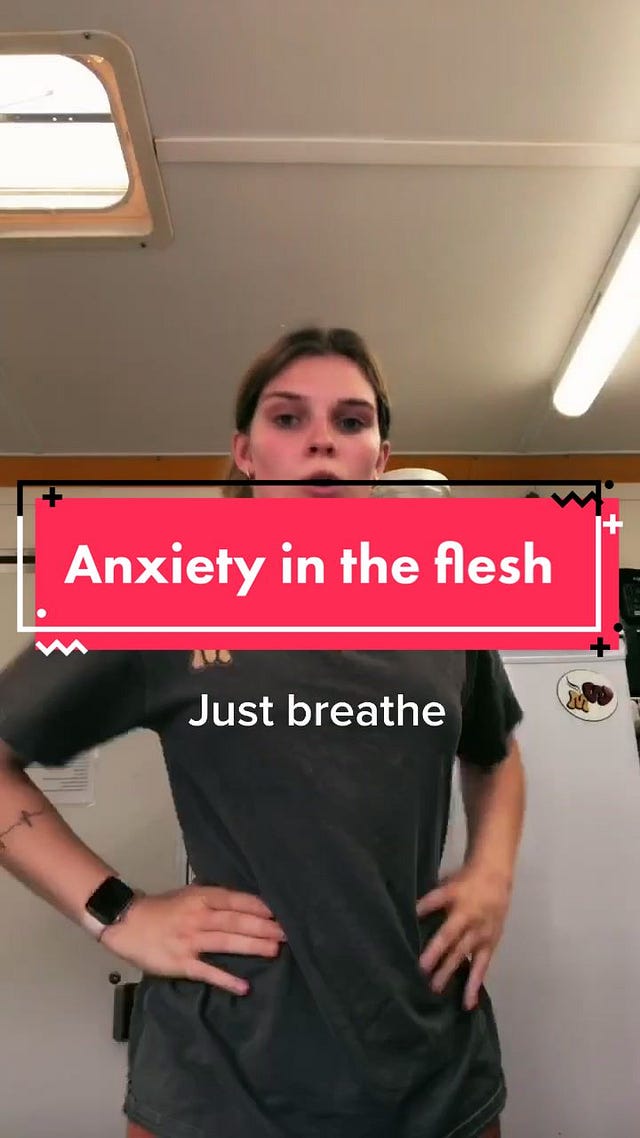Stop Opening Up About Your Mental Health Online
Instagram being #HereForYou? Hahaha, please

Something I’m increasingly sceptical of in modern mental health culture is this constant insistence to open up. Share your story! says every celebrity. Speak out! says every company. Men aren’t opening up enough, says pretty much every mainstream publication. In fact last week in the UK it was #TimeToTalkDay, urging us to be more open about mental health and share how we really feel!
My main concern with this is that Gen Z are very lonely and screen-addicted and so often take this advice and start opening up online. All over the internet, my generation are sharing their autism traits, ADHD habits and Tourette’s tics. Plus deeply personal moments: traumatic events, anxiety attacks, and mental breakdowns. On TikTok #mentalhealth has over 127 billion views; #trauma alone has almost 30 billion.
And no wonder! Not only is there this cultural push to open up, but campaigns and influencers explicitly encourage us to share our problems on social media. Like Kendall Jenner’s #howareyoureally hashtag, encouraging fans to share a video of their mental health story on Instagram. Or #postyourpill, the campaign started by Love Island influencer Dr Alex George urging people to post a photo of their mental health medication every month. “Join me,” he insists, “and take a stand against medication stigma”!
 Tiktok failed to load.
Tiktok failed to load.Enable 3rd party cookies or use another browser
I have many concerns about this. Not because I think Dr Alex has bad intentions; I’m sure he genuinely wants to help. But firstly because his fans are likely very young. We’re talking teens and pre-teens. And he’s sharing this on TikTok, where a third of US users are thought to be 14 or under, and Instagram, where more than a million users are underage. Should we really be pressuring them to “please please please” post their pill and share their mental health problems with strangers?
Then there’s this framing of it as activism. Actually, more than activism—now it’s almost a duty. You need to open up because it helps other people! Maybe, but does it help you? You, a 15 year-old girl, are not responsible for removing the stigma around autism or ADHD. The progressive narrative now also seems to be that if you aren’t opening up about your mental health problems it has to be because of stigma or discrimination. Have we forgotten the word privacy? You don’t have to be ashamed, but you don’t have to share either.
I say this because there are risks to sharing your personal struggles, especially online. Something our current mental health culture seems unable to admit is that being open about your problems comes with problems. Rarely do we talk about the regret of opening up to the wrong people, or too soon before you’ve tried to recover or really understand what’s wrong, or of misrepresenting yourself.
One major problem with opening up online, for example, is that whatever you share inevitably becomes part of your brand. This, I think, can explain a lot of Gen Z’s current obsession with and confusion around identity. We market ourselves from very young ages and then struggle to rebrand, to integrate our evolving selves into our online image. Once you share something on social media—your anxiety, OCD, gender dysphoria—it’s documented. You’re categorised. Consciously or not, you are more compelled to stick with it. But identities evolve! You are supposed to change! I find it so suffocating how modern culture makes us feel like it’s inauthentic or some sort of moral failure to change who you are or what you believe. Nobody can live up to that! And actually the opposite is true: something is very wrong if you aren’t changing.
As I see it this is why older generations often chafe at all this oversharing. Not because they can’t relate to adolescent angst or have no compassion for mental illness, but from an understanding that things, people, change. Maybe you are in real emotional pain. But don’t go blasting your gender identity journey all over the internet because someone told you it’s brave. You might not feel that way in six months, a year, six years. Even if you do, you might not want it out there. You might not even remember that you thought you had Tourette’s in your pre-teens. Also: trends change. There may not be the same cultural cachet for sharing your symptoms in the future. People might not be as rewarding or forgiving, so don’t start relying on their validation now.
This is a caution, then. A plea, actually, to the young girls recording their anxiety attacks, documenting their depressed day in the life, introducing their multiple personalities, posing with their mental health pills, to honestly think about this: what if things change for you? What if when you’re 30 you don’t want that video of you crying on your bedroom floor online? Or cleaning your messy depression room? What if you don’t even relate to that person anymore?
And please, ask yourself: is this going to be good for your recovery? Because despite what the mental health industry would have you believe, your anxiety isn’t fixed or inevitable. You could get over your OCD. But you’ll make that much less likely and harder for yourself by posting it all over the internet and publicly building your identity around it first. Maybe you’re socially anxious at 14 but not at 20, but you made it your brand and showed the internet that you struggle to make a phone call and can’t order food. Maybe you desperately want to be seen as confident but you’ve already marketed yourself as anxious and that’s how people treat you. All I’m saying is you might regret reducing yourself to a collection of symptoms. This world can be cruel and unforgiving, and you might one day regret telling it you can’t cope.
Of course I understand sharing helps people feel less alone. I also recognise that social media is a nauseating highlight reel, that everyone is pretending to be perfect and that’s so much pressure—but I don’t think the answer to that is to post all of our personal and vulnerable moments. My answer would be to post less about everything.
Because another thing I want girls to think about is who really benefits here. A good rule of thumb for when something is being pushed this much in modern culture—when you’re hearing the same mantra over and over again like open up—is to think, okay, someone is majorly profiting here, who is it? Sometimes I wonder if this message to open up is so heavily pushed by social media companies like TikTok, Snapchat and Instagram because they benefit when we plaster our problems all over their platforms. Speak out; be a spectacle! Your vulnerability is very good for engagement! #SpeakYourMind! says TikTok. “Share your mental health journey,” insists Instagram. “Talk about how you really feel with your friends!” — okay, fine so far — “…on Snapchat.” Oh. No, don’t do that.
And obviously all the solutions we need are conveniently on these platforms too. “Check out how you can take care of your mental health on Snapchat and encourage your friends to do the same!” Right, well, firstly you’re never going to take care of your mental health on Snapchat. And Instagram—the place some teens have traced back the desire to kill themselves—is absolutely not #HereForYou. Open up and find “mental health resources on Instagram”! Key words: on Instagram. All this is an attempt to keep you on their platforms. Platforms very often responsible for mental health problems. Please don’t buy it.
I’m not saying don’t tell anyone. Just don’t tell the internet. I mean that sincerely: I wouldn’t even recommend opening up to online therapists. The therapy service BetterHelp has been fined millions for selling users’ mental health data—“rest assured this information will stay private!”—to platforms like Facebook (Meta) and Snapchat. And the more these sites know you are struggling, the more advertisers can categorise you. You’ll get ads for therapy apps and ADHD meds and mental health chatbots and get stuck in a cycle. This is more than a self-fulfilling prophecy. There’s software engineering behind it.
Which is why I think we need to be careful, in this cultural moment. Careful with constantly and uncritically encouraging young people to open up. Careful saying that to a lonely and screen-addicted generation. We want to help, I know. We hate the idea of kids bottling things up. But we need some honesty here. We’ve got all these mainstream media essays wondering why Gen Z are sharing their dissociative identity disorders and posting their panic attacks while also relentlessly reminding them to open up! and telling them it’s brave and noble and risk-free to do so. Strange we don’t connect the two. Strange we unquestionably tell young men that they need to open up more and more, but never question whether we might encourage young women to open up too much. Without warning them of the dangers of doing that online.
So: open up to people you know and trust. Talk to family and friends. If you aren’t fortunate enough to have those, turn to local communities, support groups, professionals when necessary. But stop opening up on the internet. Stop opening up about everything. Give yourself the chance to change organically; give yourself the option of moving on. Bottom line is I don’t think it’s worth exchanging your deepest emotional struggles for that hit of dopamine. Because Instagram being #HereForYou? Hahaha, please. Open yourself up to friends and family. Close yourself off from these companies.
This article was originally published in Quillette, where I’m thrilled to say I’m now a monthly columnist! You can subscribe here.






The irony of sharing depressed day in the life videos on an app that’s likely responsible for the depression!
Fab article! I recently read Brave New World by Aldous Huxley and despite being 100 years old it’s so prescient. Namely, in the book there’s a disgust at citizens who do anything alone, refuse to share how they’re feeling publicly and those who do are viewed at social pariahs. He clearly saw this coming!